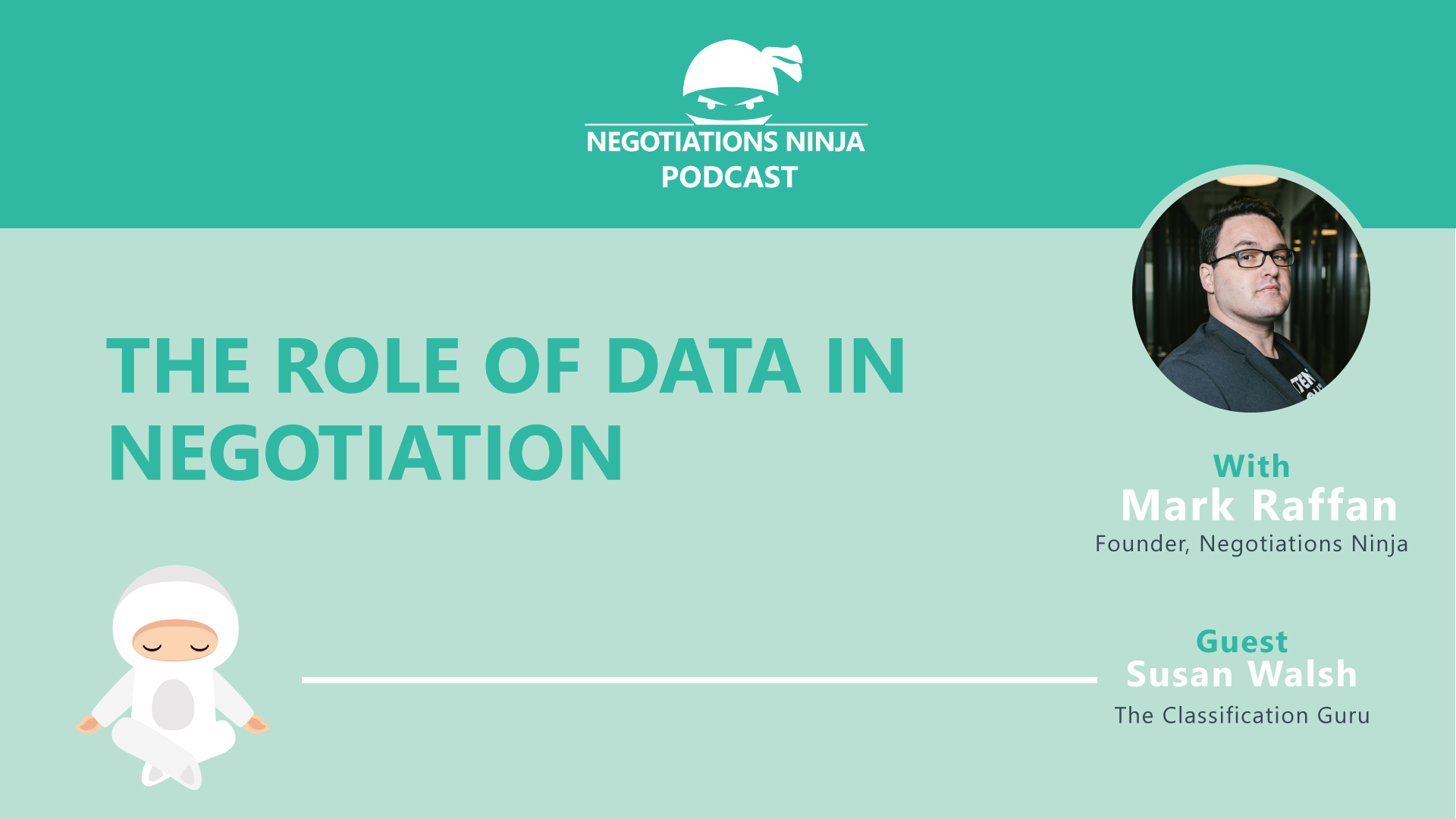Are you making decisions based on bad data? Do you even know that your data is dirty? Is your data consistent, organized, accurate, and trustworthy (COAT)? According to Susan Walsh—THE Classification Guru—your dirty data could be leading to poor business decisions that cost money and put jobs at risk. So in this episode of Negotiations Ninja, Susan tackles some of the biggest data disasters that procurement should be aware of. Don’t miss this important episode with the fixer of dirty data!
Outline of This Episode
- [2:04] Susan Walsh: The Classification Guru
- [6:03] The biggest problems in data + procurement
- [8:44] Data sheds light on the culture of a company
- [12:50] Key things procurement should know
- [17:32] How many companies know what they’re spending?
- [20:01] How to convince people classifying data is worthwhile
- [24:40] Is a spend analytics platform the same thing?
- [26:52] How to reach out to Susan Walsh
The biggest problems in data + procurement
The quality of your data determines the quality of your negotiation, but many negotiators don’t realize this. Or, they don’t want to put in the work upfront to cleanse the data properly, so they actually know what’s going on.
Susan points out that if a business doesn’t already have a classification system in place, they’re relying on figures from their supplier. Those numbers don’t necessarily match up when she classifies the data. That is dangerous. Suppliers could be hiding things in plain sight. Things can get missed because spend is sitting in another department.
Secondly, how can you negotiate anything properly if you don’t have the true numbers? I’ve worked with many procurement teams that have no idea how much money they’re spending. They may have rough estimates, but most have no idea. Even if they could classify it, they could get into the weeds on deep analytics. They don’t know how much money is going to one service or another.
Susan works with a lot of global companies. She points out that they don’t know what they’re doing with one country—imagine multiplying that globally. You may be paying different prices for the same thing in different countries from the same supplier.
How Susan classifies purchases
Susan not only has to classify line items on credit card spend but also does keyword searches. She has to be careful to check for synonyms as well. One person may use “taxi,” and another may use “cab” to describe a trip to the airport, but it’s the same spend. All of those little transactions add up to thousands of dollars in transactions. Across a large range of products, that could be a fair amount of money you could be saving.
Key things procurement should know
What are key things procurement people should know when buying a service? Susan believes they should know exactly how much they’re already spending with that supplier or from their competitor within that industry. She emphasizes that if you don’t know that, how can they give you a good quote based on the numbers you’re telling them? You can’t negotiate a better rate if you’re under-selling yourself. You could consolidate that spend or use it as leverage in the negotiation.
In some cases, you may walk into a negotiation thinking they’re using one consultant, but in some cases have spend spread across 30 other consultants that should be consolidated. It’s because some organizations with departments all over the world have their preference.
Susan points out that sometimes it’s a person’s name and not the name of their organization, so it can be hard to decipher what role they play. Based on the numbers, Susan knows it has to be some sort of consultant. There have even been some times where Susan doesn’t believe the numbers look right. Sometimes finance is giving them numbers that are 5x what the actual spend is.
Susan finds discrepancies in the details—almost like detective work—that lead to further investigations. Sometimes things just don’t quite add up. If you have $5,000 for a taxi, then you know there’s something going on.
Is bad data worse than no data? How does Susan convince companies that classifying data is worthwhile? How do you handle the objection that a spend analytics platform does the job well enough? Listen to the whole episode to hear Susan’s take on this topic!
Connect with Susan Walsh
- The Classification Guru
- Connect on LinkedIn
- Follow on Twitter
Connect With Mark
- Text me at 587-315-5948 for negotiation advice
- Follow Negotiations Ninja on Twitter: @NegotiationPod
- Connect with Mark on LinkedIn
- Follow Negotiations Ninja on LinkedIn
- Connect on Instagram: @NegotiationPod
- negotiations.ninja




